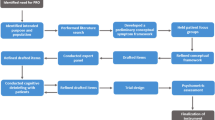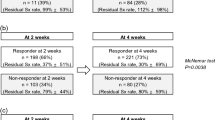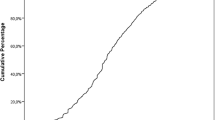Abstract
There is growing recognition of the importance of assessing patient perceptions of treatment, especially patient satisfaction. The Gastroesophageal Reflux Disease (GERD) Treatment Satisfaction Questionnaire (GTSQ) was developed to assess satisfaction with GERD medication. A web-based survey, which included the GTSQ and the GERD Symptom Assessment Scale (GSAS), was administered in September 2003 to 2511 subjects taking prescription GERD medication, identified as H2-receptor antagonists (H2RAs) and proton pump inhibitors (PPIs). Results showed excellent reliability of the GTSQ subscales (from 0.82–0.95) and validity with respect to two GSAS subscales. Rabeprazole (Aciphex) subjects taking 1 pill per day were statistically more satisfied than those taking 2 pills per day for all subscales except “Daytime Relief” and “Quick and Long-Lasting.” Those who stayed on rabeprazole therapy longer showed statistically significant greater satisfaction on the “Daytime Relief” and “Health-Related Quality of Life” scales. The GTSQ has high reliability and can be used to assess aspects of satisfaction with GERD medication.
Similar content being viewed by others
References
Locke GR 3rd, Talley NJ, Fett SL, Zinsmeister AR, Melton LJ 3rd: Prevalence and clinical spectrum of gastroesophageal reflux: a population-based study in Olmsted County, Minnesota. Gastroenterology 112:1448–1456, 1997
Farup C, Kleinman L, Sloan S, et al.: The impact of nocturnal symptoms associated with gastroesophageal reflux disease on health-related quality of life. Arch Intern Med 161:45–52, 2001
Vigneri S, Termini R, Leandro G, et al.: A comparison of five maintenance therapies for reflux esophagitis. N Engl J Med 333:1106–1110, 1995
Rothman M, Farup C, Stewart W, Helbers L, Zeldis J: Symptoms associated with gastroesophageal reflux disease: Development of a questionnaire for use in clinical trials. Dig Dis Sci 46:1540–1549, 2001
Shikiar R, Rentz AM: Satisfaction with medication: an overview of conceptual, methodological, and regulatory issues. Value in Health 7:204–215, 2004
Shikiar R, Rentz AM, Barone J, Duncanson F, Katz E: Patient satisfaction with ofloxacin (F) and polymyxin B/Neomycin/Hydrocortisone in the treatment of otitis externa: results from two randomized clinical trials. Journal of Managed Care Medicine 6:24–27, 2002
Thompson JW, Bost J, Ahmed F, Ingalls CE, Sennett C: The NCQA's quality compass: evaluating managed care in the United States. Health Aff (Millwood) 17:152–158, 1998
Weaver M, Patrick DL, Markson LE, Martin D, Frederic I, Berger M: Issues in the measurement of satisfaction with treatment. Am J Manag Care 3:579–594, 1997
Atkinson MJ, Sinha A, Hass SL, et al.: Validation of a general measure of treatment satisfaction, the Treatment Satisfaction Questionnaire for Medication, using a national panel study of chronic disease. Health and Qual Life Outcomes 2:12, 2004
Damiano A, Siddique R, Xiao X, Johanson J, Sloan S: Reductions in symptom distress reported by patients with moderately severe, nonerosive gastroesophageal reflux disease treated with rabeprazole. Dig Dis Sci 2003:657–662, 2003
Cronbach L: Coefficient alpha and the internal structure of tests. Psychometrika 16:297–334, 1951
Nunnally JC, Bernstein IH: Psychometric Theory, 3rd ed. New York, McGraw-Hill, 1994
Cohen J: Statistical Power Analysis for the Behavioral Sciences, 2nd ed. Hillsdale, NJ, Lawrence Erlbaum Associates, 1988
Atkinson MJ, Sinha A, Hass SL, et al.: Validation of a general measure of treatment satisfaction, the Treatment Satisfaction Questionnaire for Medication (TSQM), using a national panel study of chronic disease. Health and Quality of Life Outcomes 2:1–13, 2004
Revicki DA: Patient assessment of treatment satisfaction: methods and practical issues. Gut 53(Suppl 4):iv4–44, 2004
Coyne KS, Wiklund I, Schmier J, Halling K, Degl' Innocenti A, Revicki D. Development and validation of a disease-specific treatment satisfaction questionnaire for gastroesophageal reflux disease. Aliment Pharmacol Ther 18:907–915, 2003
Author information
Authors and Affiliations
Corresponding author
Rights and permissions
About this article
Cite this article
Shikiar, R., Flood, E., Siddique, R. et al. Development and Validation of the Gastroesophageal Reflux Disease Treatment Satisfaction Questionnaire. Dig Dis Sci 50, 2025–2033 (2005). https://doi.org/10.1007/s10620-005-3002-1
Received:
Accepted:
Issue Date:
DOI: https://doi.org/10.1007/s10620-005-3002-1




